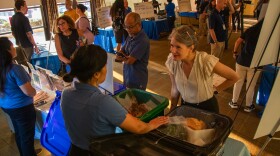Sen. Bernie Sanders spoke in San Diego on Monday at the annual conference of UnidosUS, the nation's largest Latino civil rights group. KPBS spoke with Sanders about affordable housing, homelessness, and whether "Medicare For All" is realistic.
Q: You're here in San Diego for the UnidosUS conference. What's your message to Latinos in this campaign?
A: My message is that we have got to stand together and stop Trump's effort to divide us up based on where we were born or the language that we speak or the color of our skin. This is the United States of America, and the function of a president is (to) bring people together, not foster hatred and prejudice and bigotry.
Q: We heard just this morning from UnidosUS about polling results that they've done, and they found that a strong majority of Latinos — 74% — want a presidential candidate who is willing to work with both parties and compromise to get things done. Now you're Medicare For All bill has far from enough support in Congress to actually get passed. How would you negotiate with Congress if you're elected president, and are you willing to compromise on health care to get something done?
A: You're looking at somebody who when he was in the House actually got more amendments passed working with Republicans than any other person. You're looking at somebody who just recently for the first time in 45 years passed a resolution to get the United States out of the war in Yemen, working with Republicans using the War Powers Act. I passed a major veterans bill working with John McCain. So of course I have a record of working with Republicans.
But I think in terms of health care you will be very surprised to find that not only Democrats and independents support a Medicare For All single payer program, but so do many Republicans. And the reason for that is they understand that the current system in which 87 million people are uninsured or under-insured, 500,000 people go bankrupt every year because they can't pay medical bills, and 30,000 people die because they don't get to a doctor all the time — this is not a system that we have got to continue. We need to do what every other major country on earth does: guarantee health care to all people as a human right, not a privilege. Function of health care: quality care for all, not making a hundred billion dollars in profit for the drug companies and the insurance companies.
Q: One of the hottest political issues here locally in San Diego and also in the state of California is homelessness and housing affordability. Some of your opponents in this race have put forward platforms and policy ideas about how to address that. What would you do as president?
A: Well you're right, it is a terrible, terrible problem. And it's not only the fact that we have some 500,000 homeless people in America today. But you have millions of people who are spending 45%, 50%, 60% of their limited incomes on housing. I am very proud — when I was mayor of Burlington, we initiated a community land trust concept, which has now spread, not only all over America, but all over the world. Along with Representative Barbara Lee of Oakland, we passed the National Low Income Housing Trust Fund — first major piece of legislation passed to provide low-income rental units. We have a major crisis, and as president of the United States I will work with communities all over this country and invest the billions of dollars that we need to build the millions of units that this country absolutely requires. We should not be having people sleep out on the street. We should not be having people spend 50 percent of their limited incomes on housing. We need to build housing. We need to combat gentrification, which is destroying working class communities. We need to make sure that we have a policy that works for all people, not just real estate developers.
Q: What's the most important lesson that you learned from your 2016 campaign, and what's different this time around?
A: I'll tell you what the most important lesson was, is that when you speak truth to the American people, coming forward with ideas that at the time seem very unpopular, it is amazing how quickly you change the conversation. When I talked about making public colleges and universities tuition free — "Oh Bernie. Radical idea, can't be done." Well that's what they've done in Los Angeles, San Francisco, in many parts of New York state, Tennessee and other parts of the world. When I talked about climate change being the major national security crisis that we face, people literally laughed at me. They're not laughing now. So I think the lesson that I learned is if you have the guts to tell the truth and to take on very powerful special interests, the American people will respond and other politicians will follow your lead. That's my lesson.









